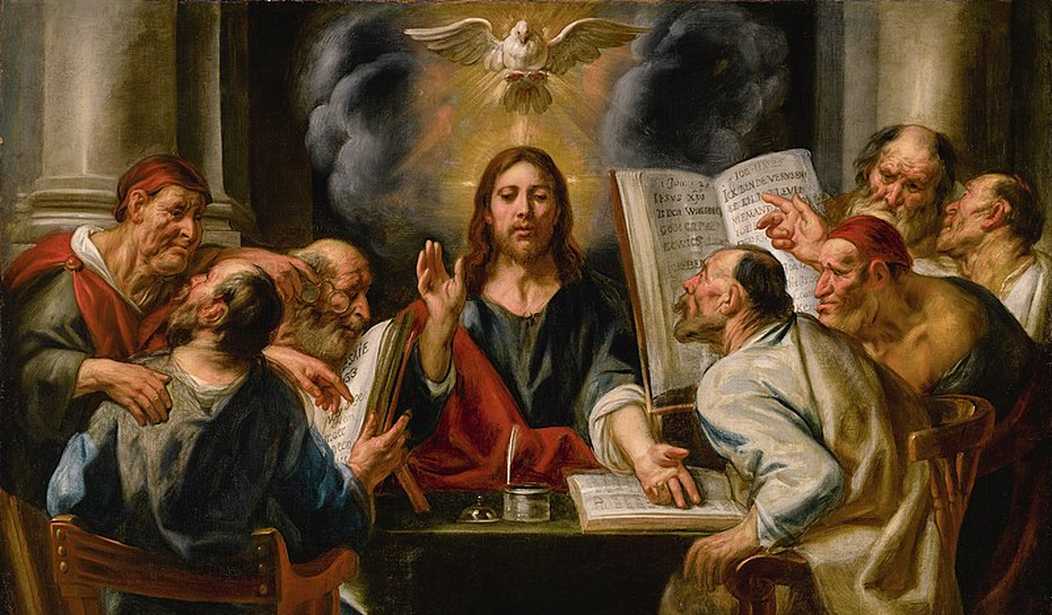This morning’s Gospel reading is Mark 3:20–35:
Jesus came home with his disciples.
Again the crowd gathered, making it impossible for them even to eat. When his relatives heard of this they set out to seize him, for they said, “He is out of his mind.” The scribes who had come from Jerusalem said, “He is possessed by Beelzebul,” and “By the prince of demons he drives out demons.”
Summoning them, he began to speak to them in parables, “How can Satan drive out Satan? If a kingdom is divided against itself, that kingdom cannot stand. And if a house is divided against itself, that house will not be able to stand. And if Satan has risen up against himself and is divided, he cannot stand; that is the end of him. But no one can enter a strong man’s house to plunder his property unless he first ties up the strong man. Then he can plunder the house. Amen, I say to you, all sins and all blasphemies that people utter will be forgiven them. But whoever blasphemes against the Holy Spirit will never have forgiveness, but is guilty of an everlasting sin.” For they had said, “He has an unclean spirit.” His mother and his brothers arrived. Standing outside they sent word to him and called him. A crowd seated around him told him, “Your mother and your brothers and your sisters are outside asking for you.” But he said to them in reply, “Who are my mother and my brothers?” And looking around at those seated in the circle he said, “Here are my mother and my brothers. For whoever does the will of God is my brother and sister and mother.”
Many years ago, I was a big fan of the TV series St. Elsewhere -- a medical drama on one level, but much more a weird, eclectic blend of melodrama, comedy, philosophy (of the pop variety, mainly), and interesting story arcs. The series launched careers for actors such as Denzel Washington, David Morse, Howie Mandel, and more. It ran for several seasons despite not garnering the best of ratings, probably due to its "prestige" factor.
One of the story arcs from the first season involved a doctor who turns out to be a rapist, and ends up getting exposed and killed in the third season. Two seasons later, another doctor goes through a near-death experience and encounters Dr. White in hell, which is depicted as a vast, empty lake with no one in sight. White is stuck in the lake all by himself until Fiscus shows up, and his hatred becomes quickly palpable.
That image has always stuck with me. It is a speculative version of hell, not entirely consonant with the Gospels snd the scriptures. Jesus Himself calls it "the eternal fire" (Matthew 25:41), and "the fiery furnace" (Matthew 13:50). Revelation mentions a lake more than once, but not as depicted in that episode (21:8):
But as for the cowardly, the faithless, the detestable, as for murderers, the sexually immoral, sorcerers, idolaters, and all liars, their portion will be in the lake that burns with fire and sulfur, which is the second death.
Clearly, we should be more inclined to these descriptions of hell than from TV shows, but still this has stuck with me as a very good analogy of what damnation is. It is willfully chosen disunity with God, a rejection of the Holy Spirit and of the Lord's fatherhood. We cast ourselves into isolation in hell, because we refuse to concede that we ourselves are not gods. We cast ourselves out from salvation, and eventually our need to make ourselves the center of the universe isolates us from everyone and everything else.
We see this throughout the arc of salvation, starting in the Garden of Eden. In our first reading from Genesis, we pick up the story of Adam and Eve after they have eaten the forbidden fruit and have discovered their nakedness. Just previous to this passage (Genesis 3:2-5), we find how the serpent tricked them into eating the fruit:
The woman said to the serpent, “We may eat fruit from the trees in the garden, but God did say, ‘You must not eat fruit from the tree that is in the middle of the garden, and you must not touch it, or you will die.’”
“You will not certainly die,” the serpent said to the woman. “For God knows that when you eat from it your eyes will be opened, and you will be like God, knowing good and evil.”
This is original sin -- attempting to usurp the authority and power of God. Before then, Adam and Eve lived in perfect unity with the Lord and His creation in the Garden. By rebelling, they broke that unity and put themselves in competition and conflict with God, and in doing so they were compelled to live outside His full presence.
But the Lord never gave up on them, nor on their offspring. Even when Cain slew Abel out of jealousy and arrogance, the Lord offered him protection -- after casting him out as well (Genesis 4:15-16). Cain's crime was against both the Lord and his brother, dividing the family and further distancing himself from the Lord, both physically and spiritually.
And this is exactly what sin does to us, too. It creates division, enmity, and eventual failure. The story of the Israelites plays this out on a grand scale. The Lord brought them out of Egypt to be a nation of priests and prophets to the world, and delivered them to the Promised Land. Instead of remaining united to the Lord for this purpose, they longed for temporal power and prestige. They demanded a king to rule over them rather than the Lord, fell into idolatry, then divided the kingdom and weakened themselves in ways that made them prey for the nations they envied.
In today's Gospel, Jesus calls us to addition rather than division. After the scribes claim that His healing comes from the devil, Jesus scoffs that Satan would attack his own demons. In a a phrase that Abraham Lincoln would later adapt and use in one of the most important political speeches in our history, Jesus warns, "If a kingdom is divided against itself, that kingdom cannot stand. And if a house is divided against itself, that house will not be able to stand." This not only would have resonated among the Judeans, the last remnant of ancient Israel, but also called on the better natures of the scribes to heed His signs and pull together for the sake of the Lord.
In fact, Jesus calls us not just to agree with each other, nor to disagree agreeably, as worthy as that might be. In the last part of today's Gospel passage, Jesus redefines the family to emphasize the true calling for unity in the Lord. When told that His "mothers and brothers and sisters" were there, Jesus teaches directly -- not through parable -- that unity in the commandments and the will of God defines the eternal family.
Jesus wants us to practice addition, not division. The only path to true unity starts by accepting the lordship of God and forming our own wills to His. Only by doing His will do we unite, not just as friends and neighbors but within the intimacy of family.
This is how we repent of Original Sin -- by discarding our desire to order Creation to our wills rather than His. And that is how we become adopted sons and daughters of the Lord, and by extension, become brothers and sisters to all those who follow Him. We are called to preach the Gospel in order to awaken as many as possible and save our potential brothers and sisters.
There will always be those who seek to divide rather than add, and who seek to rule through division rather than serve to accomplish addition. The Lord loves us and calls to us to choose unity in Him, and has ever since the Garden of Eden. The choice is ours as to which we follow, but the end game of division is very bleak ... no matter which version of the lake we contemplate.
Note: I will be on vacation the next two Sundays. We will run previous Reflections on those dates. Also, there are no previous reflections on this Gospel reading.
The front page image is "Christ Among the Pharisees" by Jacob Jordaens, c. 1660-70. Owned by The Phoebus Foundation. Via Wikimedia Commons.
“Sunday Reflection” is a regular feature, looking at the specific readings used in today’s Mass in Catholic parishes around the world. The reflection represents only my own point of view, intended to help prepare myself for the Lord’s day and perhaps spark a meaningful discussion. Previous Sunday Reflections from the main page can be found here.







Join the conversation as a VIP Member